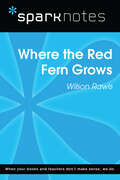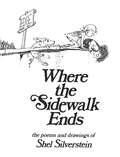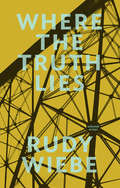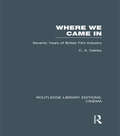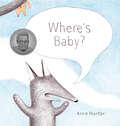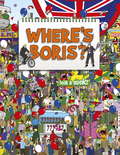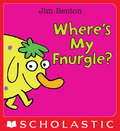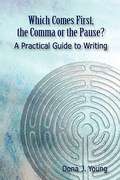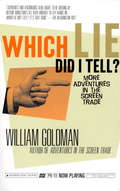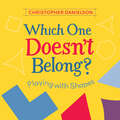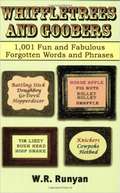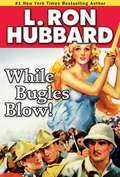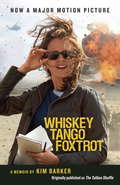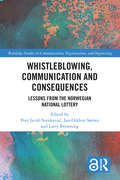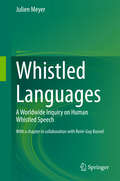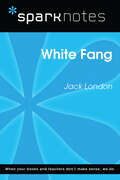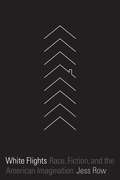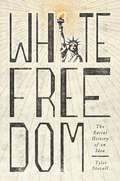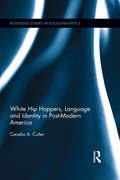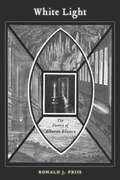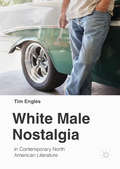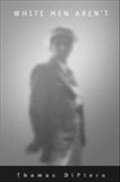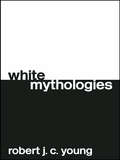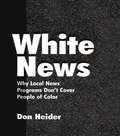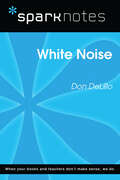- Table View
- List View
Where the Red Fern Grows (SparkNotes Literature Guide Series)
by SparkNotesWhere the Red Fern Grows (SparkNotes Literature Guide) by Wilson Rawls Making the reading experience fun! Created by Harvard students for students everywhere, SparkNotes is a new breed of study guide: smarter, better, faster. Geared to what today's students need to know, SparkNotes provides: *Chapter-by-chapter analysis *Explanations of key themes, motifs, and symbols *A review quiz and essay topicsLively and accessible, these guides are perfect for late-night studying and writing papers
Where the Sidewalk Ends
by Shel SilversteinNOW AVAILABLE AS AN EBOOK! Shel Silverstein, the New York Times bestselling author of The Giving Tree, A Light in the Attic, Falling Up, and Every Thing On It, has created a poetry collection that is outrageously funny and deeply profound. Come in . . . for where the sidewalk ends, Shel Silverstein's world begins. You'll meet a boy who turns into a TV set, and a girl who eats a whale. The Unicorn and the Bloath live there, and so does Sarah Cynthia Sylvia Stout who will not take the garbage out. It is a place where you wash your shadow and plant diamond gardens, a place where shoes fly, sisters are auctioned off, and crocodiles go to the dentist.Shel Silverstein's masterful collection of poems and drawings stretches the bounds of imagination and will be cherished by readers of all ages. This is a collection that belongs on everyone's bookshelf. Makes a great gift for special occasions such as holidays, birthdays, and graduation.And don't miss these other Shel Silverstein ebooks, The Giving Tree, A Light in the Attic, and Falling Up!
Where the Truth Lies: Selected Essays (Writer as Critic #14)
by Rudy Wiebe“The problem with writer longevity can be a complicating, even contradictory oeuvre. Hopefully.” Where the Truth Lies collects forty years of essays and speeches that award-winning author Rudy Wiebe has crafted throughout his career. In this illuminating and wide-ranging selection, Wiebe provides a look behind the curtain, revealing his thought processes as he worked on many of his great books. Within this book, he dissects controversies that arose after publication of his early novels, meditates on words and their inherent power, explores the great Canadian North and the Canadian body politic, reckons with his family history and Mennonite faith, all while providing an engaging and enlightening commentary. Where The Truth Lies is a vital compilation of a writing life.
Where we Came In: Seventy Years of the British Film Industry (Routledge Library Editions: Cinema)
by Charles Allen OakleyOriginally published in 1964, this book tells the history of the British cinematograph industry for the first time. It describes moments of splendid triumph and others of shattering failure. The mood switches from reckless optimism to demoralising pessimism, from years in which British films won the highest international awards to those when they were dismissed with scorn. It recalls a score of productions still ranked among the world's best, and the stars whose reputation was established in them. Attention is focused on the directors, those who kept to the fore during two and three decades and those with only one major success to their name. Behind them the men are identified who strove, often to their considerable financial loss, to gain a worthy place for British films in the world’s markets.
Where's Baby? (Baby Animals)
by Anne HunterA 2021 Geisel Honor book! Papa Fox is looking for Baby Fox, who is just out of his sight . . . but not ours! <p><p>An adorable, interactive read-aloud for fans of Are You My Mother? <p><p>In this clever introduction to prepositions, a near-sighted Papa is looking for his baby. Is Baby up in the tree? Is Baby under the log? Is Baby around the corner? Where could Baby be? <p><p>Readers will delight in spotting the little fox on every page as Papa wanders the forest, encountering other animals all along the way, but never quite able to spot his own baby. Anne Hunter's delicate and lovely illustrations with their limited palette highlight the humor of this adorable hide-and-seek tale. <P><P><i>Advisory: Bookshare has learned that this book offers only partial accessibility. We have kept it in the collection because it is useful for some of our members. Benetech is actively working on projects to improve accessibility issues such as these.</i>
Where's Boris?
by VariousSearch for Boris Johnson in this eye-boggling illustrated adventure!Greetings citizens! Can you spot Boris?In an array of crowded scenes, from zip wires and bikes to Beijing and the Bullingdon Club, search for Boris amongst the masses. Anyone for wiff-waff?With oodles of in-jokes and bonus material to find, plus cameo appearances from some old chums, this book provides hours of fun for both the lovers and loathers of the blonde-mop-topped phenomenon that is... BoJo.A classic and fun gift book, tracking Boris down around the world will be endless amusement for all the family.
Where's My Fnurgle?: A Peek-A-Boo Book (Jim Benton Board Books)
by Jim BentonJim Benton brings on the humor in a brand-new line of board books!I have a fnurgle but I can't find him.Where's my fnurgle?Oh, look. My fnurgle's on the chair.Don't you see my fnurgle there?Jim Benton, the international bestselling author and illustrator of Dear Dumb Diary, presents a clever, rollicking new board book program that will leave toddlers wide-eyed and laughing. Fans of Sandra Boynton will rejoice in this fresh line of funny stories!Each board book features: - Hilarious stories based on early concepts - Endearing characters- Young, bold, colorful artwork
Which Comes First, the Comma or the Pause: A Practical Guide to Writing
by Dona J. YoungDo Commas matter? You be the judge. Oscar Wilde illustrated the confusion about commas and pauses perfectly when he said, "I have spent most of the day putting in a comma and the rest of the day taking it out." If you are basing your writing decisions on guesses, now is the time to stop the uncertainty-it is costing you too much time, effort, and credibility. This book takes the mystery out of how to produce good writing by untangling core concepts and making them easy to learn. Here is a promise: Read this book from cover to cover, and you will bring your writing to a higher level. You will get your ideas down quickly and then edit like a pro.
Which Lie Did I Tell?
by William GoldmanFrom the Oscar-winning screenwriter of Butch Cassidy and the Sundance Kid and The Princess Bride (he also wrote the novel), and the bestselling author of Adventures in the Screen Trade comes a garrulous new book that is as much a screenwriting how-to (and how-not-to) manual as it is a feast of insider information.If you want to know why a no-name like Kathy Bates was cast in Misery-it's in here. Or why Linda Hunt's brilliant work in Maverick didn't make the final cut-William Goldman gives you the straight truth. Why Clint Eastwood loves working with Gene Hackman and how MTV has changed movies for the worse-William Goldman, one of the most successful screenwriters in Hollywood today, tells all he knows. Devastatingly eye-opening and endlessly entertaining, Which Lie Did I Tell? is indispensable reading for anyone even slightly intrigued by the process of how a movie gets made.From the Trade Paperback edition.
Which One Doesn't Belong?: Playing with Shapes
by Christopher DanielsonTalking math with your child is simple and even entertaining with this better approach to shapes!Written by a celebrated math educator, this innovative inquiry encourages critical thinking and sparks memorable mathematical conversations. Children and their parents answer the same question about each set of four shapes: "Which one doesn't belong?" There's no one right answer--the important thing is to have a reason why. Kids might describe the shapes as squished, smooshed, dented, or even goofy. But when they justify their thinking, they're talking math! Winner of the Mathical Book Prize for books that inspire children to see math all around them."This is one shape book that will both challenge readers' thinking and encourage them to think outside the box."--Kirkus Reviews, STARRED review
Whiffletrees and Goobers: 1,001 Fun and Fabulous Forgotten Words
by W. R. RunyanDid you know that a horse apple is actually a type of orange? Or that a whiffletree is not a tree at all? You will, after you pore through this delightful dictionary of old-fashioned words that are quickly slipping from America’s vocabulary. With over 100 illustrations, and steeped in nostalgia, it makes for a fun trip down memory lane. Wander into America’s past and play a game of Rolley Holley, buy a Tin Lizzy, and make friends with some doughboys. And if you want to know where to put a snaffle or when to perform the Green Corn Stomp Dance, the answers are here. With its convenient format, this guide is great for anyone curious about what things were really like "back in the day.”
While Bugles Blow!
by L. Ron HubbardLaunch into the action with this gritty tale. An American lieutenant in the French Foreign is caught in the middle of an ancient feud between the Jeppas of the Atlas Mountains and the bloodthirsty tribe of Perviz al Bahman.Tension mounts as a gorgeous female Jeppa warrior with golden red hair is drawn into the midst of the conflict and captured by Perviz's tribe. When the American lieutenant later finds her being sold on the slave market, he unthinkingly does what any man must: he rescues her. But while his actions may have saved a beauty, they have also just ignited all-out war. "...one of the best pulp writers of the 1940s."--Library Journal
Whiskey Tango Foxtrot (The Taliban Shuffle MTI)
by Kim BarkerNow a Major Motion Picture titled Whiskey Tango Foxtrot starring Tina Fey, Margot Robbie, Martin Freeman, Alfred Molina, and Billy Bob Thornton. From tea with warlords in the countryside to parties with drunken foreign correspondents in the "dry" city of Kabul, journalist Kim Barker captures the humor and heartbreak of life in post-9/11 Afghanistan and Pakistan in this profound and darkly comic memoir. As Barker grows from awkward newbie to seasoned reporter, she offers an insider's account of the region's "forgotten war" at a time when all eyes were turned to Iraq. Candid, self-deprecating, and laugh-out-loud funny, Barker shares both her affection for the absurdities of these two hapless countries and her fear for their future stability.
Whistleblowing, Communication and Consequences: Lessons from The Norwegian National Lottery (Routledge Studies in Communication, Organization, and Organizing)
by Peer Jacob Svenkerud; Jan-Oddvar Sørnes; Larry BrowningWhistleblowing, Communication and Consequences offers the first in-depth analysis of the most publicized, and morally complex, case of whistleblowing in recent European history: the Norwegian national lottery, Norsk Tipping. With contributions from the whistleblower himself, as well as from key voices in the field, this book offers unique perspectives and insights into not only this fascinating case, but into whistleblowing and wrongdoing in organizations more broadly. An international team of scholars use fourteen different theoretical lenses to show the complex and multi-faceted nature of whistleblowing. The book begins with an ethnographic account by the whistleblower story and proceeds into an analysis of the literature and conceptual topics related to that whistleblowing incident to present the lessons that can be learnt from this extreme example of institutional failure. This fascinating, complex, and multi-theoretical book will be of great interest to scholars, students and industry leaders in the areas of public relations, corporate communication, leadership, corporate social responsibility, whistleblowing and organizational resistance.
Whistled Languages
by Julien MeyerThe main focus of this monograph on whistled speech is the result of a worldwide inquiry primarily based on the author's unprecedented fieldwork and laboratory experience. The different questions raised by the origin and the evolution of whistled forms of languages are also explored, including the role of environmental constraints in the emergence of whistled speech, their phonetic and phonological typology, the cognitive processing of whistled signals, monogenesis and polygenesis scenarios, the hypothesis of a whistled system preceding voiced speech, the intricate relationship between music and language in whistling, and the convergence/divergence with whistled communication among animals (birds, dolphins and primates). This book also includes several documents and a chapter prepared in collaboration with René-Guy Busnel, a pioneer in the studies of whistled forms of languages who has worked with five different populations using whistled speech (from the late 60s to the early 90s). The author has been intensively studying this fascinating language practice for the past 12 years, including 30 months of onsite research in collaboration with the cultural representatives of approximately twenty linguistic communities around the world. Whistled speech represents an ancient traditional telecommunication system that has survived on all inhabited continents of our planet. In it, a whistle replaces the voice and carries the information. However, this practice does not replace ordinary speech but is used in a complementary way. It serves to increase the audible range, but also under certain circumstances, the degree of secrecy of spoken communications. Whistled speech is adapted to the structure of each language, to specific traditional rural activities such as hunting or shepherding, and to specific ecological milieux. It is today a severely endangered speech register that provides an alternative insight into the nature of human language.
White Fang (SparkNotes Literature Guide Series)
by SparkNotesWhite Fang (SparkNotes Literature Guide) by Jack London Making the reading experience fun! Created by Harvard students for students everywhere, SparkNotes is a new breed of study guide: smarter, better, faster. Geared to what today's students need to know, SparkNotes provides: *Chapter-by-chapter analysis *Explanations of key themes, motifs, and symbols *A review quiz and essay topicsLively and accessible, these guides are perfect for late-night studying and writing papers
White Flights: Race, Fiction, and the American Imagination
by Jess RowA bold, incisive look at race and reparative writing in American fiction, by the author of Your Face in MineWhite Flights is a meditation on whiteness in American fiction and culture from the end of the civil rights movement to the present. At the heart of the book, Jess Row ties “white flight”—the movement of white Americans into segregated communities, whether in suburbs or newly gentrified downtowns—to white writers setting their stories in isolated or emotionally insulated landscapes, from the mountains of Idaho in Marilynne Robinson’s Housekeeping to the claustrophobic households in Jonathan Franzen’s The Corrections. Row uses brilliant close readings of work from well-known writers such as Don DeLillo, Annie Dillard, Richard Ford, and David Foster Wallace to examine the ways these and other writers have sought imaginative space for themselves at the expense of engaging with race.White Flights aims to move fiction to a more inclusive place, and Row looks beyond criticism to consider writing as a reparative act. What would it mean, he asks, if writers used fiction “to approach each other again”? Row turns to the work of James Baldwin, Dorothy Allison, and James Alan McPherson to discuss interracial love in fiction, while also examining his own family heritage as a way to interrogate his position. A moving and provocative book that includes music, film, and literature in its arguments, White Flights is an essential work of cultural and literary criticism.
White Freedom: The Racial History of an Idea
by Tyler StovallThe racist legacy behind the Western idea of freedomThe era of the Enlightenment, which gave rise to our modern conceptions of freedom and democracy, was also the height of the trans-Atlantic slave trade. America, a nation founded on the principle of liberty, is also a nation built on African slavery, Native American genocide, and systematic racial discrimination. White Freedom traces the complex relationship between freedom and race from the eighteenth century to today, revealing how being free has meant being white.Tyler Stovall explores the intertwined histories of racism and freedom in France and the United States, the two leading nations that have claimed liberty as the heart of their national identities. He explores how French and American thinkers defined freedom in racial terms and conceived of liberty as an aspect and privilege of whiteness. He discusses how the Statue of Liberty—a gift from France to the United States and perhaps the most famous symbol of freedom on Earth—promised both freedom and whiteness to European immigrants. Taking readers from the Age of Revolution to today, Stovall challenges the notion that racism is somehow a paradox or contradiction within the democratic tradition, demonstrating how white identity is intrinsic to Western ideas about liberty. Throughout the history of modern Western liberal democracy, freedom has long been white freedom.A major work of scholarship that is certain to draw a wide readership and transform contemporary debates, White Freedom provides vital new perspectives on the inherent racism behind our most cherished beliefs about freedom, liberty, and human rights.
White Hip Hoppers, Language and Identity in Post-Modern America: White Hip-hoppers, Language And Identity In Post-modern America (Routledge Studies in Sociolinguistics #8)
by Cecelia CutlerThis book examines language and identity among White American middle and upper-middle class youth who affiliate with Hip Hop culture. Hip Hop youth engage in practices that range from the consumption of rap music and fashion to practices like MC-ing (writing and performing raps or "rhymes"), DJ-ing (mixing records to produce a beat for the MC), graffiti tagging, and break-dancing. Cutler explores the way in which these young people stylize their speech using linguistic resources drawn from African American English and Hip Hop slang terms. She also looks at the way they construct their identities in discussions with their friends, and how they talk about and use language to construct themselves as authentic within Hip Hop. Cutler considers the possibility that young people experimenting with AAVE-styled speech may improve the status of AAVE in the broader society. She also addresses the need for educators to be aware of the linguistic patterns found in AAVE and Hip Hop language, and ways to build on Hip Hop skills like rhyming and rapping in order to motivate students and promote literacy.
White Light: The Poetry of Alberto Blanco (Bucknell Studies in Latin American Literature and Theory)
by Ronald J. FriisWhite Light: The Poetry of Alberto Blanco examines the interplay of complementary images and concepts in the award-winning Mexican writer's cycle of poems from 1979 to 2018. Blanco’s poetic trilogy A la luz de siempre is characterized by its broad range of form and subject and by the poet's own eclectic background as a chemist, maker of collages, and musician. Blanco speaks the language of the visual arts, science, mathematics, music, and philosophy, and creates work with deep interdisciplinary roots. This book explores how polarities such as space and place, reading and writing, sound and silence, visual and verbal representation, and faith and doubt are woven through A la luz de siempre. These complements reveal how Blanco’s poetry, like the phenomenon of white light, embraces paradox and transforms into something more than the sum of its disparate and polychromatic parts.
White Male Nostalgia in Contemporary North American Literature
by Tim EnglesWhite Male Nostalgia in Contemporary North American Literature charts the late twentieth-century development of reactionary emotions commonly felt by resentful, yet often goodhearted white men. Examining an eclectic array of literary case studies in light of recent work in critical whiteness and masculinity studies, history, geography, philosophy and theology, Tim Engles delineates five preliminary forms of white male nostalgia—as dramatized in novels by Sloan Wilson, Richard Wright, Carol Shields, Don DeLillo, Louis Begley and Margaret Atwood—demonstrating how literary fiction can help us understand the inner workings of deluded dominance. These authors write from identities outside the defensive domain of normalized white masculinity, demonstrating via extended interior dramas that although nostalgia is primarily thought of as an emotion felt by individuals, it also works to shore up entrenched collective power.
White Men Aren't
by Thomas DipieroPsychoanalytic theory has traditionally taken sexual difference to be the fundamental organizing principle of human subjectivity. White Men Aren't contests that assumption, arguing that other forms of difference--particularly race--are equally important to the formation of identity. Thomas DiPiero shows how whiteness and masculinity respond to various, complex cultural phenomena through a process akin to hysteria and how differences traditionally termed "racial" organize psychic, social, and political life as thoroughly as sexual difference does. White masculinity is fraught with anxiety, according to DiPiero, because it hinges on the unstable construction of white men's cultural hegemony. White men must always struggle against the loss of position and the fear of insufficiency--against the specter of what they are not. Drawing on the writings of Freud, Lacan, Butler, Foucault, and Kaja Silverman, as well as on biology, anthropology, and legal sources, Thomas DiPiero contends that psychoanalytic theory has not only failed to account for the role of race in structuring identity, it has in many ways deliberately ignored it. Reading a wide variety of texts--from classical works such as Oedipus Rex and The Iliad to contemporary films including Boyz 'n' the Hood and Grand Canyon--DiPiero reveals how the anxiety of white masculine identity pervades a surprising range of Western thought, including such ostensibly race-neutral phenomena as Englightenment forms of reason.
White Mythologies
by Robert J.C. YoungWe must, many now argue, `get back' to history. but which one? History has always been a problematical concept in Western theory, particularly for Marxism. In the wake of postmodernism, its status has become ever less certain. Is it possible to write history that avoids the trap of Eurocentrism?Robert Young's investigation of 'the history of History', from Hegel and Marx to Althusser and Foucault, calls into question the Eurocentrism of traditional Marxist accounts of a single 'World History', in which, as he shows, the `Third World' appears as an unassimilable excess, surplus to the narrative of the West. Young goes on to consider recent questionings of the limits of Western knowledge. He argues that the efforts of Edward Said, Gayatri Chakravorty Spivak and Homi Bhabha to formulate non-historicist ways of thinking and writing history are part of a larger project of a decolonisation of History and a deconstruction of 'the West'.
White News: Why Local News Programs Don't Cover People of Color (Routledge Communication Series)
by Don HeiderIs TV news racist? If the purpose of local news is to cover individual communities and to present issues of interest and concern to local audiences, why are local newscasts so similar in markets around the country? These are the questions that motivated Heider's research, leading to the development of this book. Recognizing that local news is the outlet through which most people get their news, Heider ventured into the local television newsrooms in two moderate-size, culturally diverse U.S. markets to observe the news process. In this report, he uses his insider's perspective to examine why local television news coverage of people of color does not occur in more meaningful ways. Heider examines the perceptions of racism and ethnicity, and addresses such dichotomies as "white" news (content determined by white managers) being delivered by non-white news anchors, thus giving the appearance of "non-white" news. He also considers how coverage of minorities influences viewers' perceptions of their minority neighbors. Heider then sets forth a new theoretical concept--incognizant racism--as a way of explaining how news workers consistently ignore news in significant portions of the communities they cover. This contribution to the minorities and media discussion provides important insights into the newsroom decision-making process and the sociology and structure of newsrooms. It is required reading for all who are involved in news reporting, mass communication, media and minority studies, and cultural issues in today's society.
White Noise (SparkNotes Literature Guide Series)
by SparkNotesWhite Noise (SparkNotes Literature Guide) by Don DeLillo Making the reading experience fun! Created by Harvard students for students everywhere, SparkNotes is a new breed of study guide: smarter, better, faster. Geared to what today's students need to know, SparkNotes provides: *Chapter-by-chapter analysis *Explanations of key themes, motifs, and symbols *A review quiz and essay topicsLively and accessible, these guides are perfect for late-night studying and writing papers
